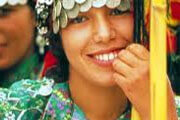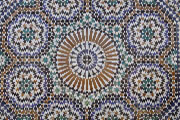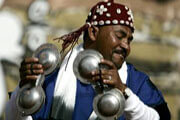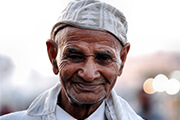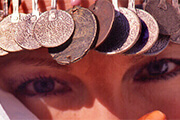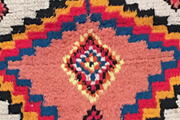Culture and Customs of Morocco
As like all other countries, Morocco is special with its own culture. Futhermore it is also a place of acceptance towards differences. We shall speak to you about its own authentic features, but also the reality where Morocco has become a country where you'll find an embracing of other cultures and traditions and even a practice in certain corners. This country has truly known the meaning of multitude, given that its culture has changed a lot throughout the history.
As you travel across Morocco, you will discover it is a land of art and history, the country alone has hosted Berbers, Phoenicians, Arabs, South (Sub-Saharan African) and North (Romans, Vandals, Spanish-Andalusians, both Muslim and Jewish): however, the majority of Morocco's population is Berber and Arab by identity, and at least a third of the population speaks the Amazigh language.
What is Morocco well known for?
Moroccan People
The Moroccans are the inhabitants and the citizens of Morocco, Most of them have Berber or Arab origin. there are 38M Moroccan in the World about 33M are living in Morocco and about 2.5M are living in France and Spain.
Learn more about Moroccan people
Moroccan Values and Attitudes
Moroccan people follow the principles of Islam, Moroccan families has a strong foundation in unity, whatever it is the nuclear family as well as the extended one. Children's are expected to take care of their parents when the grow old, therefore there are very few elderly homes compared to western culture.
Traditional Clothing
Our traditional dress here is the Djellaba, although it is not what youngsters wear nowadays. There is also the Caftan which we might wear at weddings too ! Usually these are worn with 'Balgha' (flat slippers made from leather) but at weddings women wear Caftans or Takchitas with heels.
Further details about Moroccan traditional clothing
Moroccan Weddings
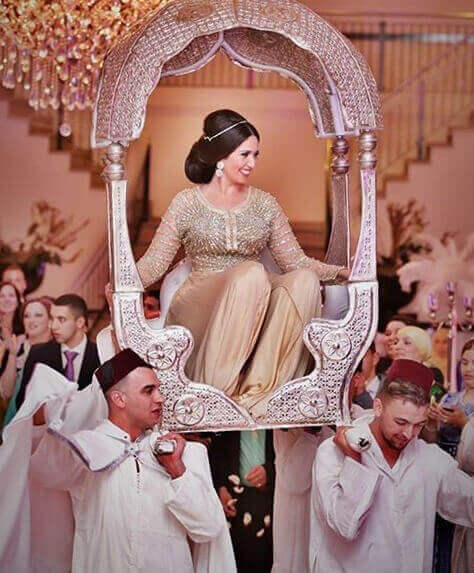
Moroccan weddings are out of this world ! A groom is required to give his bride special gifts before the big day such as sugar or henna as well as other gifts chosen by him. Two days before the wedding, custom requires the bride to go to the traditional Moroccan Hamam (sauna) with her relatives.. as it is considered an act of purification where they sing traditional songs together. The next ceremony that takes place uses the famous Moroccan Henna.. As they get a professional to draw meaningful symbols on the hands and the feet of the bride. Ceremonies differ in different cities, but what never changes is the fact that the Moroccan wedding lasts at least four to eight hours, and they use Negafa (a women who offers make-up services) to take care of the bride and how she looks. They also use an Amariya (traditional ornamental chair) for both the bride and the groom. As they lift them up in what seems to be a sort of chair.
All of these are considered traditions : Whether it is the weddings or the music which we call « Dekka El Merrakchya » or the Henna that you will find offered to you everywhere on the streets or even pouring the tea making « Rezza » .. Moroccan traditions are certainly one of a kind ! And these are the traditions which truely make the Moroccan culture.
Moroccan Food
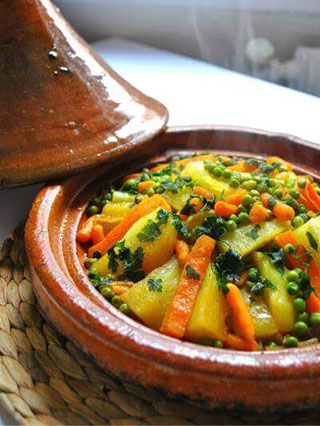
The first think any Moroccan will start telling you about when you ask him where he is from is the food ! Yes, the food, : believe it or not, it is hard to describe Moroccan food in words alone. From Pastilas to Tajines and Couscous, the meals will charm you! They are not only well cooked but also immensely detailed. Especially the spices ! Ask any Moroccan and he'd tell you how knowing how to work with spices is the most important part about Moroccan cuisine.
The spices most usually used are cumin, salt, pepper, oregano, parsley, coriander, caraway and even mint! Next comes ginger, paprika, turmeric and saffron. Perhaps the most essential thing you should know about Moroccan spices is that we have a spice of our own called 'Ras El Hanout'. This spice is made out of 27 different other spices
Now, Moroccan cuisine is typically a mix of Mediterranean, Arabic, Andalusian and Berber cuisine. It is highly influenced by its interactions and exchanges with other cultures which only shows how multicultural Morocco is! The above is only an introduction to Moroccan cuisine. If you are planning on visiting us soon then perhaps consider trying the following meals : Bissara which is a soup of dried broad beans, Harira which is rich with tomatoes, lentils, chickpeas and lamb, and all spiced up with a squeeze of lemon juice and coriander, Tagine which is probably the first dish you should try! try Couscous next. And last but not least, Maakouda (a potato pancake) ! But what you should keep in mind is that even though it is only one country, you'll find each one of these dishes cooked differently in certain cities and in each home. Which is probably why you should come yourself and check out what we're talking about! Rest assured, you'll be warmly welcomed.
Moroccan Architecture
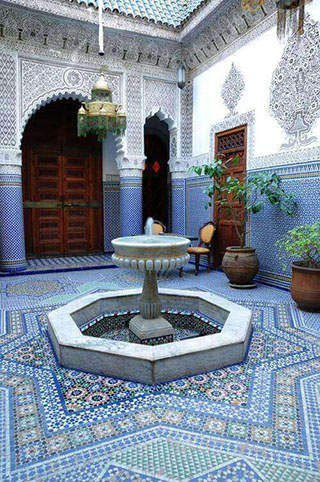
Moroccan Architecture has been greatly influenced by numerous architectural styles such as Arabic architecture for fountains, Geometric Design and Islamic calligraphy, Persians techniques for tiling concept (Zellige), Al-Andaluz Architecture (Southern Spanish) for Andalusian gardens and arches. More recent buildings are influenced by French architecture due to France occupying Morocco in 1912. That said, more modern buildings keep a balanced combination of all these architecture style, learn more about Moroccan Architecture here
Moroccan Music
Moroccan Music is one of the fundamental aspects of Morocco's culture, There are many different musical styles to be found in Morocco, each one with its own history. You can find Amazigh music from the Rif, Andalusian music from Rabat, Fes and Oujda, Chaabi from the Atlas, Ahidous from the Souss as well as Gnawa plus many more.
Learn more about Moroccan Music
To learn more about Moroccan Culture you can find some Moroccan Travel Guidebooks specialy selected for you here
Moroccan Hospitality
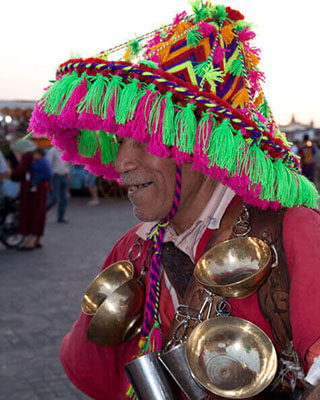
This is another one of the country characteristics, its citizen's hospitality. Moroccan people are probably ones of the nicest people you'll ever meet! They will welcome you into their homes without even the need to make sure of who you really are, they feel the need to feed you until you can not eat anymore, don't be surprised if your are invited to drink "Atay" this is the Moroccan Mint Tea, this delicious drink is composed by gunpowder tea, Sugar, water and fresh mint (or chiba - Artemisia arborescens - during winter), during the Tea ceremony they will tell you all the stories you might need or not need to know about their land and guide you through your entire journey. As for youngsters ? They'll introduce you to the mixture of culture in every possible aspect and teach you what fun really means over here.
Moroccan culture and traditions
More information about Moroccan culture.
Join our Mailing List and receive electronic invitations and news about cultural events in Morocco.
Advertisement
Advertisement
